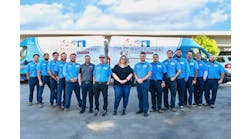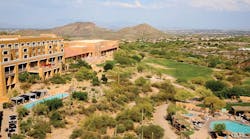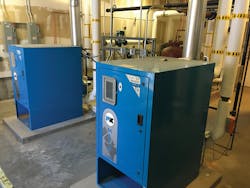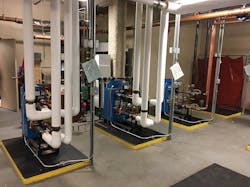The JW Marriott Starr Pass Resort and Spa in Tucson, Ariz., offers its guests amenities such as three Arnold Palmer-designed desert golf courses, a full-service spa, and a multi-level pool and lazy river. It can accommodate 3,300 guests for business meetings and social events. With 540 guest rooms and 35 suites, ensuring guests are happy and comfortable is the resort’s main priority.
Providing hot water for all of its guests’ needs is part of that focus. But that function was problematic as the resort’s inefficient heating boilers were operating separately from the domestic hot water system. Over-sized storage tanks were contributing to additional energy losses. Both loops were running 365 days per year due to a requirement of hot water reheat on the hydronic side of the system. The system was also failing to use current technological advancement effectively.
When resort management decided to replace its outdated and inefficient water heating system, Tucson-based McCook Boiler & Pump Co. took on the project. The manufacturer’s rep firm specializes in the sales, installations and service of steam and hot water boilers, pumps and water conditioning equipment. The company’s journeymen are factory-trained and certified across their entire lineup of products. McCook also offers engineering, contracting and fabricating services.
“Our goal as a company has always been to provide a turnkey project experience which rivals the competition,” explains Quinton Lamoreaux,
McCook’s vice president of engineered sales. “We assist and provide support at every level of the project: from design assistance (we partner with local engineering firms for formal drawing submissions), product selection and application, to final installation and project management. Most important of all, we continue to support our products and customers beyond project completion and startup, with qualified warranty service and technical support, all under one roof.”
The company began as a Georgia boiler manufacturer in 1916 by Robert Lee McCook Sr. as McCook & Son Inc. In 1929, the business moved to Tempe, Ariz., and continued to manufacturer boilers through the 1950s. R.L. McCook Jr. converted the company to a boiler service shop; its first sales representation agreement was with Los Angeles-based Parker Boiler Co. In 1979, Dean McCook (son of R.L. McCook Jr.) moved to Tucson and started McCook Boiler & Pump Co.
Today, Dean McCook serves as chairman of McCook Boiler & Pump; his son Tom is president and CEO, and son Adam McCook is vice president of customer and tech support. The rep/engineering/contracting firm has four project salesman, seven technicians, three office support staff covering three locations: Tucson, Las Vegas and Sandy, Utah.
System design
The main goals of the JW Marriott Starr Pass Resort project were to eliminate 6,000 gallons of stored hot water and ensure that the new system could meet compliance with corporate initiatives for performance and Legionella mitigation.
McCook’s scope of work for the project was threefold:
1. Preliminary system design and product sizing/selection;2. Product sale and delivery to Marriott; and
3. Supporting the installing mechanical contractor during the installation process and providing factory startup for the new systems.
The nucleus of the new water-heating system is the Patterson-Kelley condensing boilers in three zones — a P-K Sonic SC4000, two P-K Mach C1050 and two P-K Mach C1500s — and three sets of the P-K Duration III, a fully-packaged water-to-water indirect domestic hot water system, engineered to complement any condensing source. The boilers help supply hot water to the Duration III units to produce instantaneous domestic hot water to the three DHW zones throughout the resort. The project also included Thrush Company pumps, air separators and expansion tanks.
“The indirect water heaters generate instantaneous hot water at a very precise level of temperature control, and require a relatively low boiler water temperature delivery (140 ˚F or less),” notes Lamoreaux, a 12-year boiler industry veteran who managed the project for McCook. “This lower boiler water temperature requirement is perfectly suited for condensing boilers; the lower the temperature, the higher the efficiency. The selected boilers consistently operate at efficiencies in the mid-90s. And the indirect water heaters allowed us to eliminate all of the hot water storage tanks.”
The boilers are placed in a primary heating water loop, with a two-way automatic control valve on the inlet side of each boiler to control flow, based on demand, he adds (see sample piping diagram). The boilers deliver the hot water to the bank of indirect water heaters — double-wall heat exchangers with three-way modulating control valves that provide precise temperature controllability to the exchanger sets.
Project Challenges
The biggest challenge McCook Boiler & Pump had at the design stage was convincing Marriott’s corporate engineers that the systems truly would eliminate all hot water storage.
“We resolved this by clearly documenting all our design load calculations, flow rates and system temperature requirements,” Lamoreaux says. “Then, we compared those calculation results with the certified capacities of each indirect water heater and corresponding condensing boilers. We made several presentations in person and also participated in conference calls with corporate-level engineers.”
During the installation stage, the challenge was keeping the old hot water systems in service throughout the construction of the new systems to prevent prolonged outages or shut-down periods.
“Hotel guests need hot water 24/7,” he explains. “The installing contractor used the existing storage tanks, relocated them to a different spot within the mechanical room, and kept old water heaters running at least one at a time to keep the hot water tanks in service. The new boilers and indirect water heaters were installed in stages, and parts of the new system were started up and tested before all existing old equipment was removed.”
The result is a water-heating system with energy savings of about 50 percent and a total cost payback in less than five years. “And eliminating the stored hot water greatly contributes to Marriott’s Legionella mitigation plan,” Lamoreaux notes.
This system has been operational for a little more than 18 months. Lamoreaux notes that soon after the system was put into service, the property received a phone call from its gas utility provider, Southwest Gas.
“They notified the hotel that something must be wrong with the gas meter and asked to come out and perform a survey and analysis,” he says. “Well, nothing was wrong with the meter. With the installation of these new water heating systems, the property has cut its natural gas consumption by more than 50 percent. There have been zero complaints about hot water or lack of hot water since the systems were started up.”







